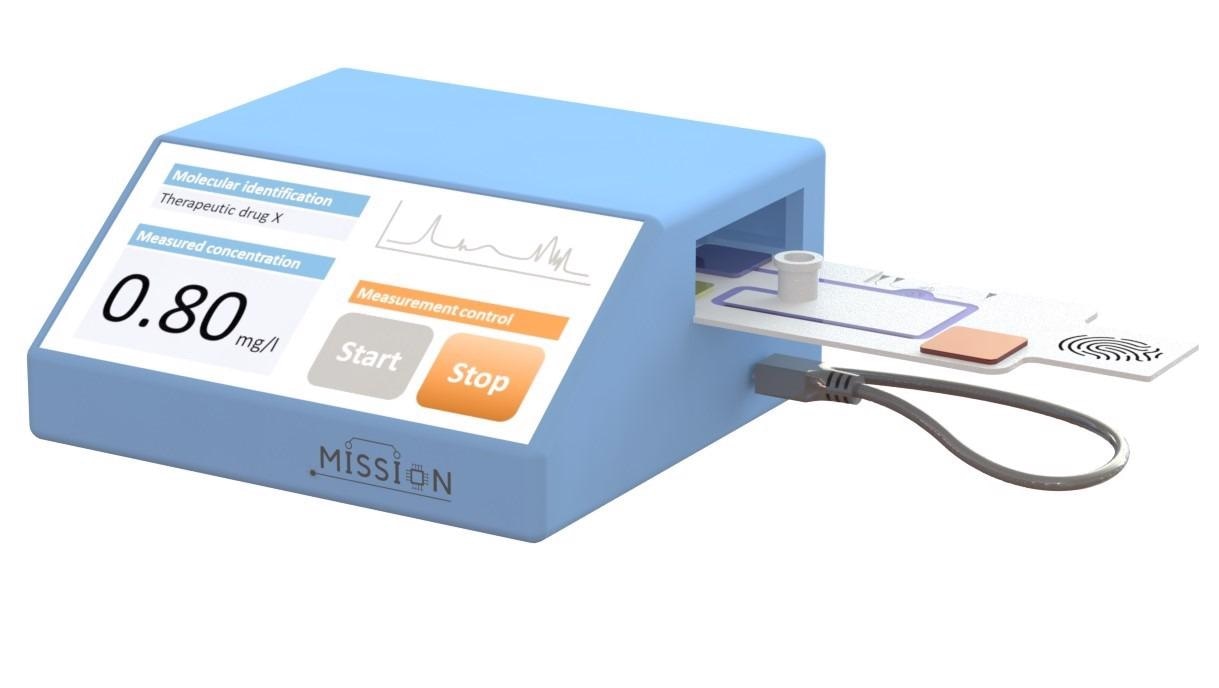Apr 13 2021
A team of photonics engineers, healthcare clinicians and oceanographers are set to lead an ambitious project to develop the next generation of photonics technology that will enable rapid diagnostic medical screening and environmental monitoring.
 Vision of low cost sensor technology for measuring drug concentrations Image Credit: David Rowe, University of Southampton.
Vision of low cost sensor technology for measuring drug concentrations Image Credit: David Rowe, University of Southampton.
Silicon photonics has transformed data communications technology thanks to its low cost and high performance. This new research project will aim to bring the benefits of this technology to a range of new applications that could be manufactured at a mass scale to solve societal challenges and transform peoples’ lives. Currently silicon photonics applications operate in the near-infrared wavelength range (1.2 μm – 1.6 μm). Key to this project will be the development of chip-scale sensors in the mid-infrared wavelengths (3-15μm); this is known as the “fingerprint region” as it enables sensors to spot unique identifiers in biological and chemical molecules.
The collaboration, which brings together research leaders from the Universities of Southampton, Sheffield and York, the University Hospital Southampton and the National Oceanography Centre, has been awarded a £5.8 million grant by the Engineering and Physical Sciences Research Council. The team will produce novel fundamental components, such as Mid Infrared waveguide technology (Southampton & York), light sources (Sheffield), detectors (York & Southampton), as well implementing the key optical sensing technologies on-chip (National Oceanography Centre, York & Southampton), and packaging and electronic read-out (National Oceanography Centre). Led by the clinical and environmental experts (University Hospital Southampton and National Oceanography Centre), and in consultation with key end users of the technology – including the NHS and industry partners - the team will focus on three key research demonstrators:
- Liquid biopsy for faster cancer detection
Biopsies often require tissue samples to be sent away for costly laboratory analysis. The vision for the project is the development ubiquitous sensors to detect the proteins that indicate certain forms of cancers via patients’ blood. without the need for hospital stays.
- Monitoring of therapeutic drug levels
Deployment of low cost sensing devices in homes or in GP surgeries to measure the concentration of certain drugs would lead to better treatment and outcomes for patients, and reduce outpatient appointments in NHS hospitals.
- Measuring greenhouse gas emissions from the oceans
Today, monitoring of gas (such as carbon dioxide) exchange between the atmosphere and the oceans requires large fragile systems on ships with high carbon footprints. Wide deployment of miniaturised sensing technology will transform measurement of the impact of climate change mitigation strategies.
The team will utilise their world leading expertise in photonics, medicine, electronics, sensing and packaging in order to extend the technical capability of silicon photonics to mid-infrared wavelengths for these and other sensing applications.
Professor Graham Reed, Head of the Silicon Photonics Research Group at the University of Southampton and Principal Investigator for the project said: “I’m delighted that the EPSRC has chosen to trust us with this important technology development work. We have put together an exceptional multidisciplinary team that I am confident can collectively make huge progress towards better lives for people around the world”.
Professor Saul Faust, Professor of Paediatric Immunology & Infectious Diseases at the University of Southampton and Director of the Southampton NIHR Clinical Research Facility, said “Quite often technologies are invented and it then takes time to work out how to use them in the real world. This award gives clinicians the opportunity to work with Prof Reed and colleagues right from the start to bring new devices to the NHS much more quickly than has been possible in the past”.
Professor Matt Mowlem, from the National Oceanographic Centre said “I am excited to work with world leading colleagues to conceive fundamental yet robust advancements in optics and sensor technology, for greenhouse gasses and the ocean’s role in their reduction, applicable even on small robots and in the harshest polar ocean winters”